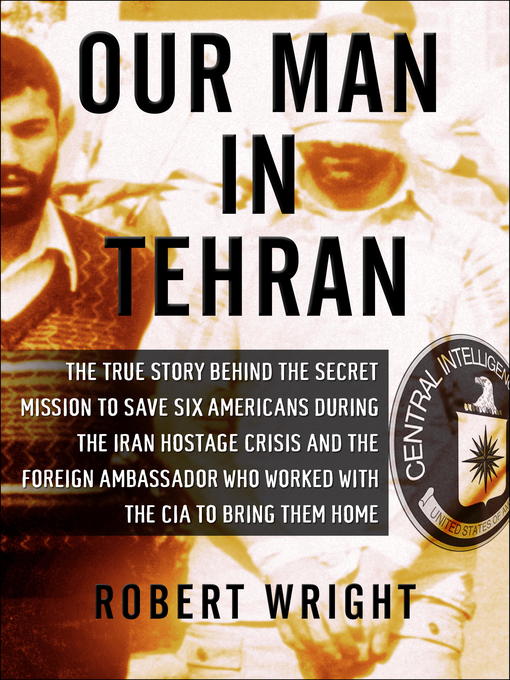
Our Man in Tehran
Ken Taylor and the Iran Hostage Crisis
کتاب های مرتبط
- اطلاعات
- نقد و بررسی
- دیدگاه کاربران
نقد و بررسی

Starred review from November 8, 2010
Much of Iran's relationship with the West—and their mutual antipathy—stems from the muddled events of a single day: November 4, 1979, when Iranian militants overran the U.S. embassy in Tehran, launching a 444-day-long hostage drama. What's often forgotten is that six Americans evaded their would-be captors and were protected and eventually extracted from Iran by Canadian diplomats. In this fascinating account of spycraft and compassion, Wright (Three Nights in Havana) puts newly unclassified documents to excellent use in recounting how Canadian ambassador Ken Taylor hid the Americans who had slipped out a side door and gathered intelligence for the U.S. government. Wright sketches the historic grievances that lay at the heart of the embassy takeover and dispels lingering myths—among them, that the occupiers were "idealistic student amateurs"—crafting an absorbing story of genuine heroism and suspense.

November 1, 2010
Thrilling account of the 1979 Iranian hostage crisis that focuses on the little-known role of Canadian diplomats in protecting Americans.
Wright (History/Trent University/Three Nights in Havana, 2008) notes that the crisis, which transfixed the world for 444 days, was quickly forgotten by the same American public infuriated by it. When the Iranian student radicals "freed the American captives, in January 1981, the crisis faded from public view." As a result, the role of Canadian ambassador Ken Taylor was relegated to a historical footnote. Wright argues that his actions in sheltering six U.S. diplomats who'd avoided the initial assault on the embassy were selfless and intrepid and set a high standard for diplomatic nobility. One of the narrative's greatest strengths is the author's sense of historical context. He sets the stage for the conflagration by looking back to 1953, when the CIA deposed the elected nationalist Mohammed Mosaddegh in favor of Shah Pahlavi, correctly perceived as in line with U.S. Cold War goals. By the '70s, worldwide revulsion over the shah's police-state tactics provided an opening for his nemesis, the exiled Ayatollah Khomeini, whose Islamist followers toppled the regime surprisingly fast. President Jimmy Carter's decision to admit the shah for medical care proved the last straw for Khomeini's student followers; Khomeini himself quickly endorsed their seizure of the embassy in order to diminish the power of moderates. This violation of diplomacy's basic principles outraged Taylor, and through a tense series of intrigues, the Canadians wound up sheltering six fugitive American diplomats. Taylor provided much intelligence to the White House and CIA as they planned various responses (including the ill-fated "Eagle Claw" rescue mission), leading to the successful exfiltration of the fugitives, a bright spot in an otherwise disastrous period. Ronald Reagan presented him with the Congressional Gold Medal, in response to which Taylor observed, with typical modesty, "The United States faces the rebuffs of history with patience, determination, and a search for justice."
A well-constructed history of a remarkable story, the repercussions of which are still felt today.
(COPYRIGHT (2010) KIRKUS REVIEWS/NIELSEN BUSINESS MEDIA, INC. ALL RIGHTS RESERVED.)

Starred review from January 1, 2011
November 1979: the world is watching as the Shah of Iran is removed from power, replaced by Ayatollah Khomeini. Those old enough to remember can recall the taking of 54 hostages from the American embassy who were then held for 444 days, but few know about six American diplomats who secretly escaped and were kept in safe havens by diplomats and workers from Iran's Canadian embassy. Wright (history, Trent Univ.; Three Nights in Havana) focuses on Ken Taylor, the outwardly unassuming Canadian ambassador in Iran, and unravels in painstaking detail how Taylor, at President Jimmy Carter's behest, became embroiled in top-secret negotiations to bring the escaped hostages home safely. VERDICT When narrative nonfiction reads like the plot of an espionage movie, readers can't help but be drawn in and held fast, as is the case here. This title will appeal to those interested in American history and international affairs, as well as to the reader who enjoys a high-risk spy yarn. Especially timely during current world tensions between nations whose mutual hostilities could yield an outcome similar to the true tale told here. With an extensive bibliography and endnotes.--Krista Bush, West Haven, CT
Copyright 2011 Library Journal, LLC Used with permission.

December 1, 2010
To the inside story of the 1979 Iranian seizure of the U.S. embassy and personnel, which includes memoirs by policymakers, military and intelligence officials, and captives, add this account about the Canadian ambassador in Tehran, Kenneth Taylor. Its generally known that he facilitated the escape from Iran of several American diplomats but not in the detail imparted by Wright. From interviews with Taylor and other Canadians and from extant material about the crisis, Wright crafts an informative narrative of Taylors formal protests of the egregious violation of international diplomacy that the embassy invasion represented and his surreptitious succor to the Americans. The latter consisted of Canadians casing the embassy for a rescue mission, hiding a group of Americans who had eluded the embassy takeover, and providing forged Canadian passports for them. The fakes use in the escape was recounted in a colorful CIA memoir, Antonio Mendezs The Master of Disguise (1999). Wrights spotlight on the courageous Canadian role in hoodwinking the kidnappers will also interest readers of Mark Bowdens Guests of the Ayatollah (2006).(Reprinted with permission of Booklist, copyright 2010, American Library Association.)

























دیدگاه کاربران